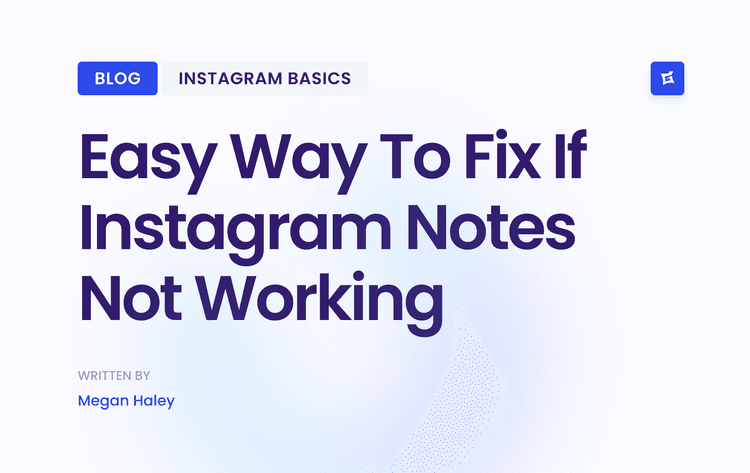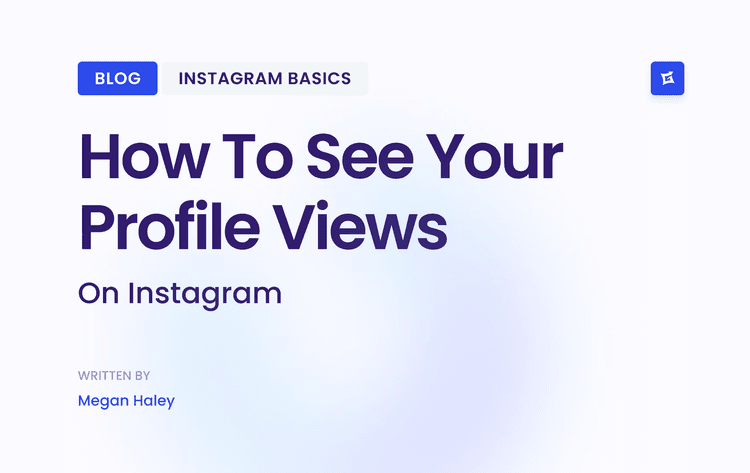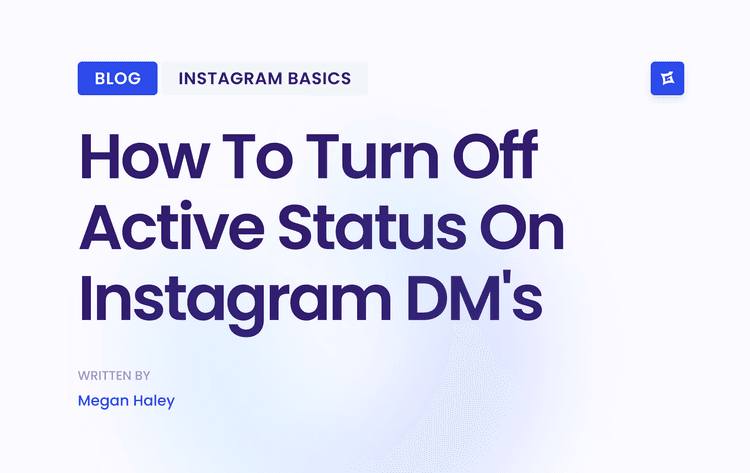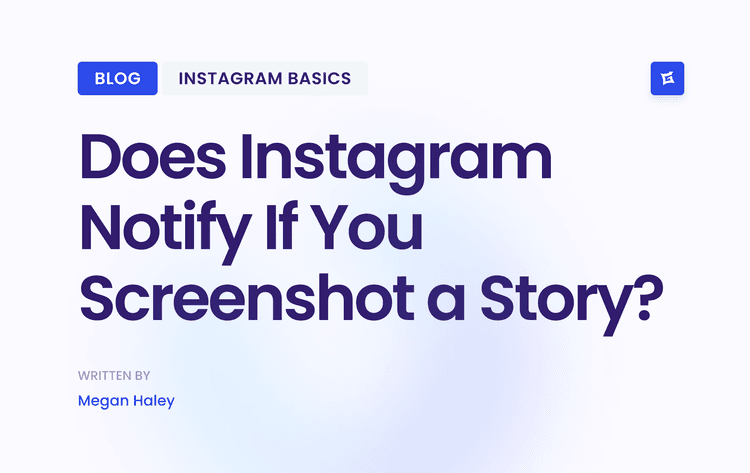1. CreatorIQ
CreatorIQ positions itself as a top influencer marketing platform for enterprise-level brands and agencies managing complex, large-scale creator programs. Its strength lies in its comprehensive, data-driven approach, moving beyond simple discovery to offer a full suite of tools for governance, measurement, and workflow automation. The platform allows users to build a private, vetted creator network and manage every stage of the relationship, from initial outreach to payment and reporting, all within a centralized system.
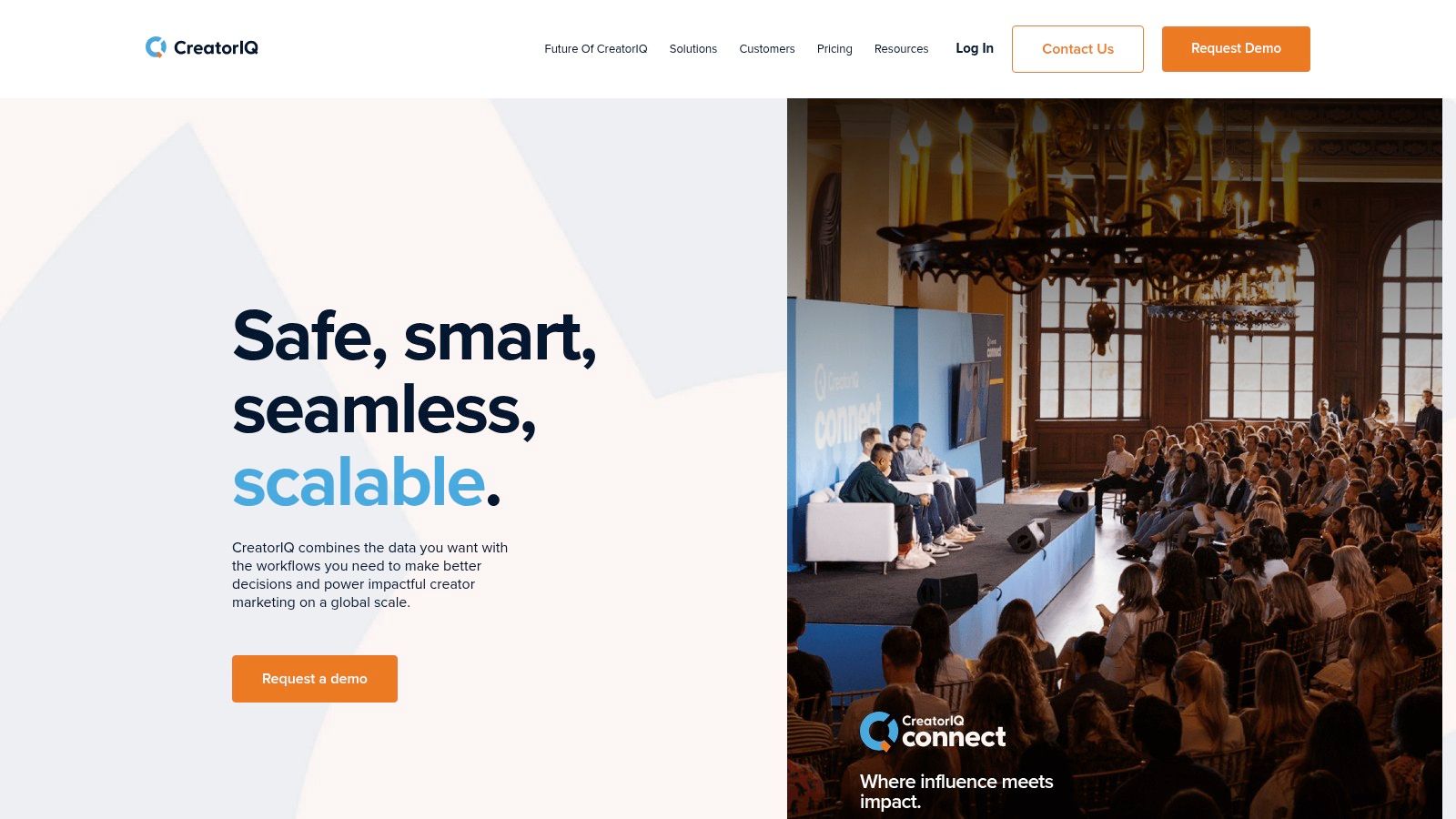
What truly sets it apart is its deep analytical capability. CreatorIQ provides robust competitive benchmarking and brand safety tools, ensuring campaigns align with brand values and perform effectively against industry standards. This focus on security and data integrity makes it a trusted partner for global brands.
Key Details & Considerations
Best For: Mid-market to large enterprise companies requiring advanced analytics, security, and scalable program management.
Pricing: Quote-based. Pricing is customized based on specific needs, number of users, and program scale, which means it is a significant investment compared to other platforms.
Pros: Exceptional data analytics, strong security and governance features, and extensive enterprise-level integrations (e.g., Oracle, SAP).
Cons: The platform’s complexity requires dedicated onboarding and team training. It is not suitable for small businesses or those new to influencer marketing due to its cost and feature depth.
Website: https://www.creatoriq.com/
2. GRIN
GRIN establishes itself as a leading all-in-one creator management platform specifically designed for direct-to-consumer (DTC) and e-commerce brands. Its core philosophy revolves around fostering authentic, brand-owned relationships rather than relying on a transactional marketplace model. The platform provides a comprehensive suite of tools to discover, recruit, manage, and analyze influencer partnerships, streamlining the entire campaign lifecycle from a single, unified dashboard. It is one of the top influencer marketing platforms for brands prioritizing direct creator connections.
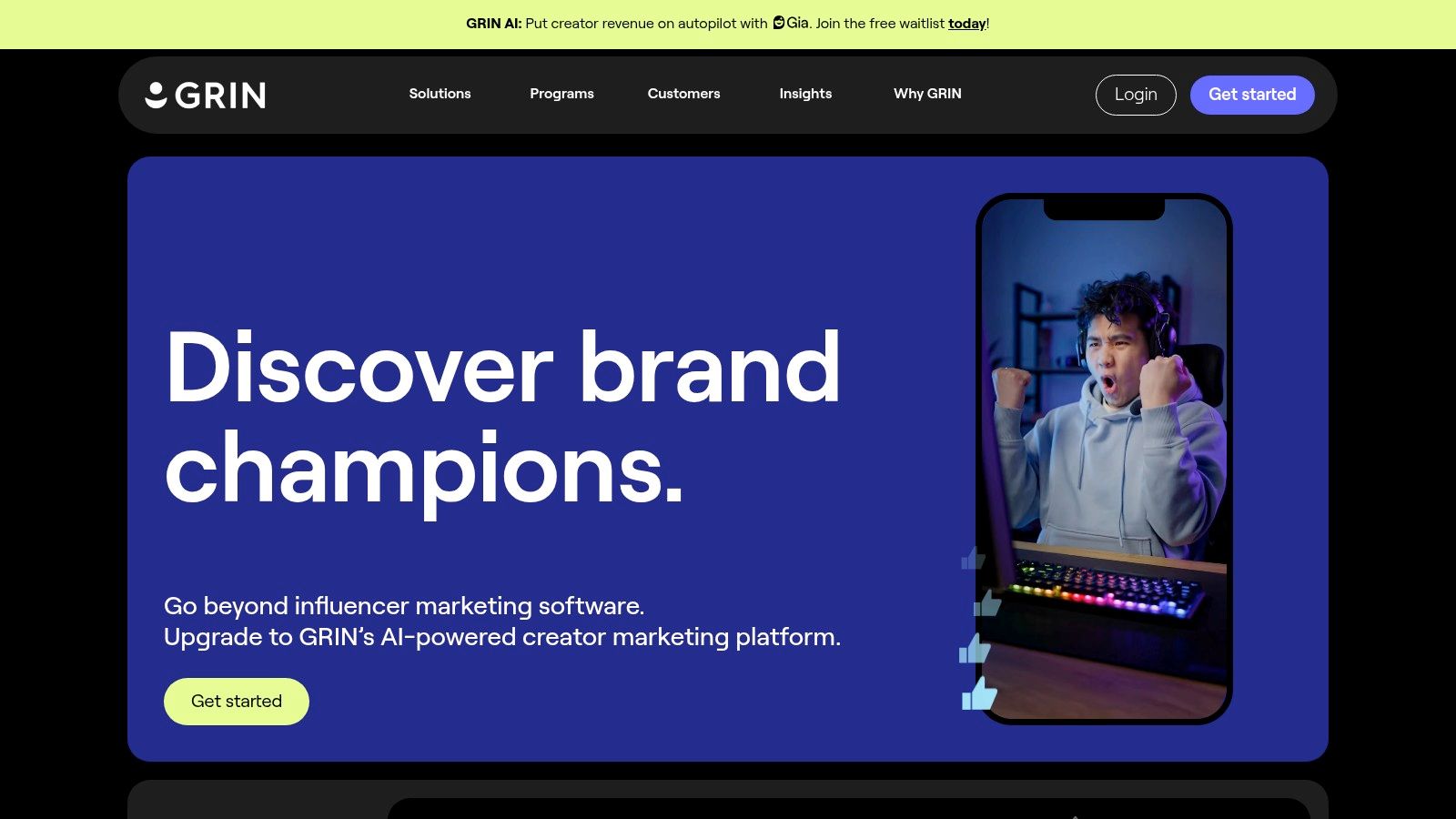
What makes GRIN stand out is its deep integration with e-commerce ecosystems like Shopify, WooCommerce, and Magento. This connection allows brands to manage everything from product seeding and affiliate link generation to sales tracking and payment processing seamlessly. The platform’s mature workflows support scaling influencer programs effectively, handling content management, real-time analytics, and even tax document administration, which is crucial for building a sustainable creator community. This comprehensive approach streamlines the complex process of collaborating with influencers and measuring their direct impact on sales.
Key Details & Considerations
Best For: E-commerce and direct-to-consumer brands of all sizes looking to build and scale an in-house creator program with a focus on authentic relationships and sales attribution.
Pricing: Quote-based. Pricing is customized and typically reflects its premium, all-in-one feature set, making it a significant investment.
Pros: Exceptional e-commerce integrations (especially Shopify), comprehensive workflow automation, and robust tools for managing product seeding, payments, and content.
Cons: The custom pricing is generally not budget-friendly for small teams or startups. Its focus on building your own network means it lacks a browseable marketplace for quick discovery.
Website: https://grin.co/
3. Upfluence
Upfluence serves as a comprehensive influencer and affiliate marketing platform, making it one of the top influencer marketing platforms for brands seeking an all-in-one solution. Its strength is its broad toolset, which combines a massive influencer database with powerful outreach automation, affiliate management, and integrated payment processing. The platform allows users to manage everything from discovering creators and seeding products to tracking affiliate commissions and handling global payouts.
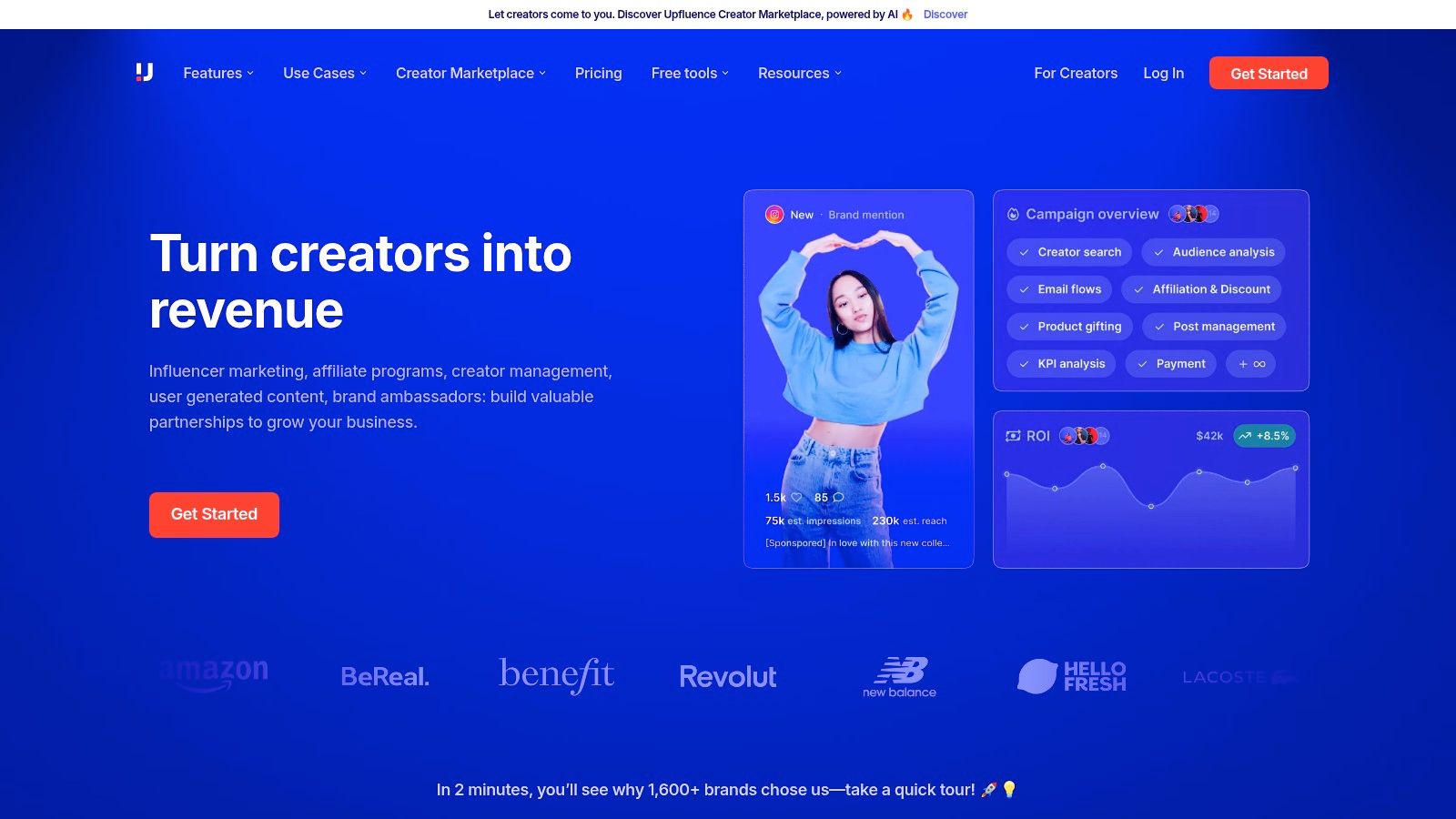
What sets Upfluence apart is its blended approach to influencer and affiliate marketing, complete with an AI assistant to streamline communication. This integration, along with specific features for Amazon campaigns and one-click product seeding, makes it exceptionally versatile for e-commerce brands looking to scale both their awareness and performance marketing efforts simultaneously.
Key Details & Considerations
Best For: E-commerce brands and agencies wanting a single platform to manage both influencer collaborations and affiliate/commission-based campaigns.
Pricing: Quote-based. Pricing is customized, which can make it a more expensive option, especially for smaller teams or startups.
Pros: Broad toolset covering the entire workflow from discovery to payouts, useful integrations for Amazon sellers, and effective outreach automation.
Cons: The custom pricing model can be a barrier for businesses with limited budgets, and the wide range of features might present a learning curve for new users.
Website: https://www.upfluence.com/
4. impact.com/Creator
impact.com/Creator frames influencer marketing as a performance-driven partnership, integrating it seamlessly into the broader affiliate and partnership ecosystem. It moves beyond simple awareness metrics to provide end-to-end program management, focusing on tangible outcomes such as sales and conversions. The platform excels at tracking the direct impact of creator content on revenue and lifetime value, making it a powerful tool for brands prioritizing ROI.
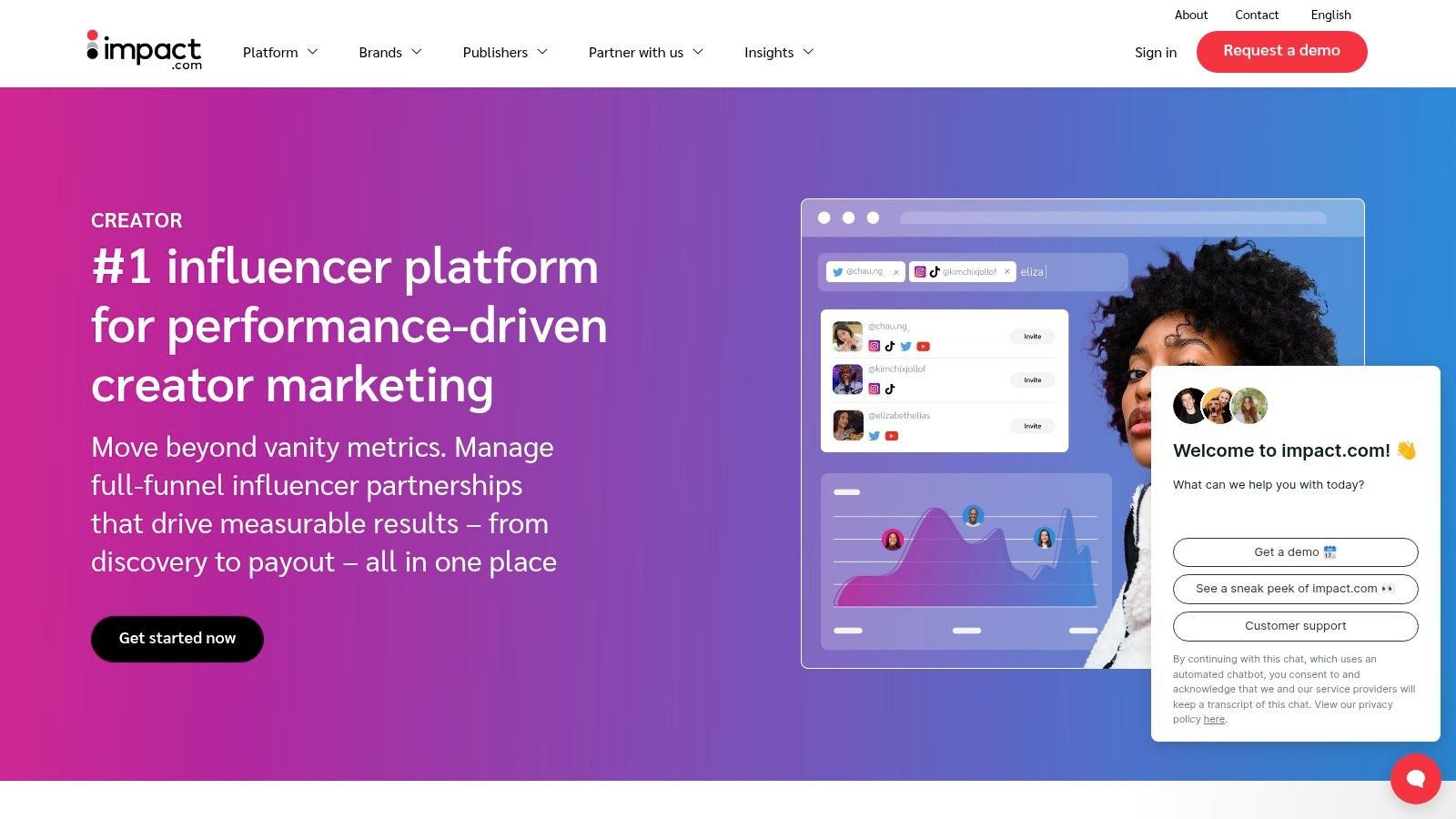
What makes impact.com/Creator one of the top influencer marketing platforms is its unified approach. It allows businesses to manage creator campaigns alongside affiliate, media, and other referral programs all in one place. This holistic view provides deeper insights into which partnerships drive the most value, supported by robust contracting, payment, and usage rights workflows.
Key Details & Considerations
Best For: E-commerce and direct-to-consumer brands that want to measure creator performance with the same rigor as their affiliate marketing programs.
Pricing: Custom quote-based. The pricing is sales-led and typically includes implementation support, positioning it for businesses ready to invest in performance partnerships.
Pros: Directly ties creator activity to measurable performance metrics, and combines creator management with broader affiliate and referral programs for a unified strategy.
Cons: The custom, sales-led pricing model may not be transparent or accessible for smaller businesses, and its focus on performance tracking might be too complex for simple awareness campaigns.
Website: https://impact.com/creator/
5. Sprout Social Influencer Marketing (formerly Tagger)
Sprout Social positions its influencer marketing suite, formerly known as Tagger, as an integrated solution for brands already managing their broader social media presence. Its core strength is connecting influencer activities directly to overall social media strategy and business outcomes. The platform offers a unified workflow for discovery, campaign management, reporting, and even creator payments, streamlining processes that are often fragmented across multiple tools.
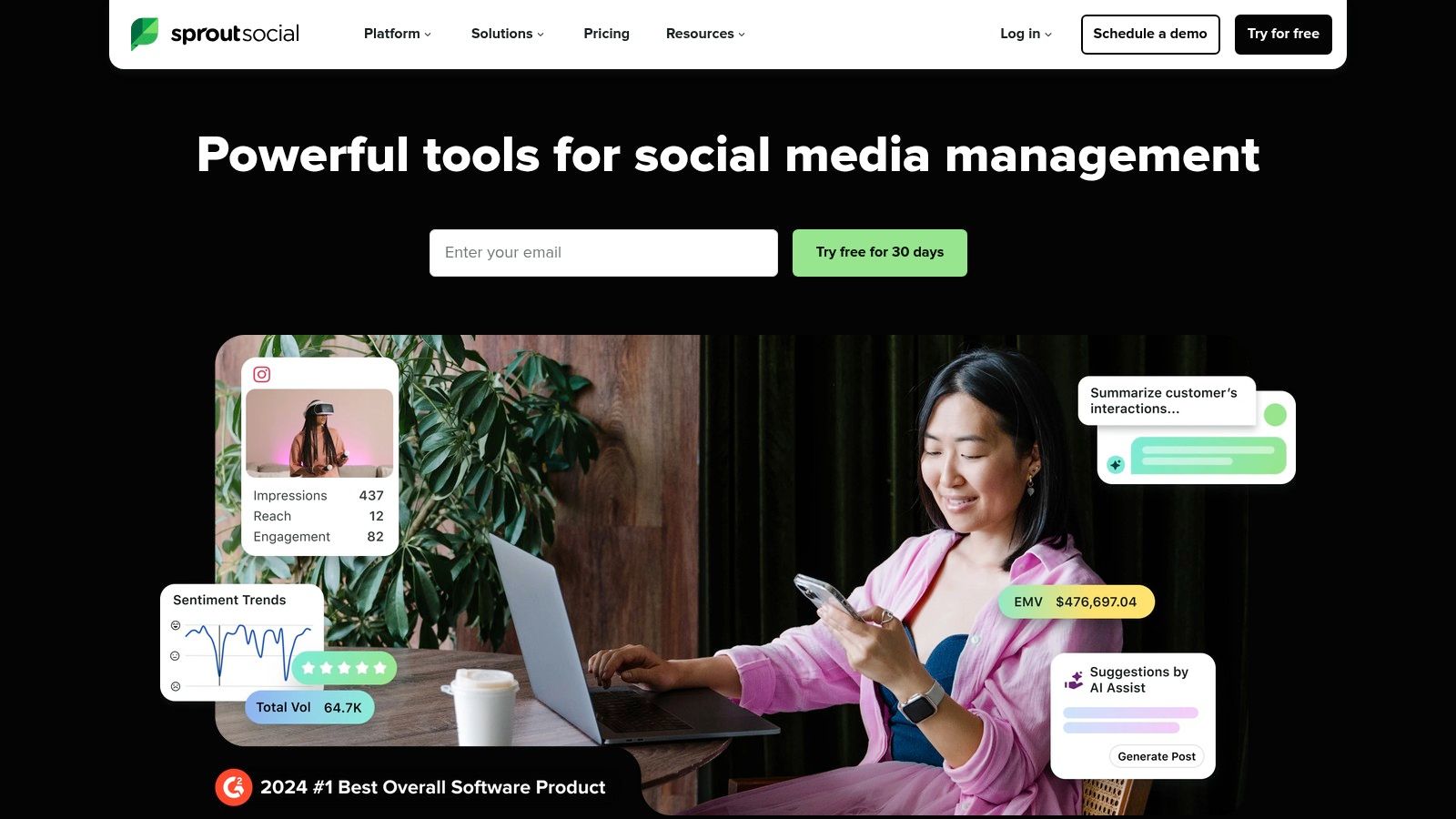
What makes this platform unique is its seamless link to Sprout’s powerful social listening and analytics engine. This allows marketers to not only manage influencer campaigns but also measure their true impact alongside organic and paid social efforts. By providing tools for conversion tracking via UTMs and pixels, Sprout helps brands move beyond vanity metrics to prove ROI, a key component in all successful influencer marketing campaigns.
Key Details & Considerations
Best For: Existing Sprout Social customers and brands wanting to unify their influencer marketing with their overall social media management and analytics.
Pricing: The influencer marketing suite is available as a sales-quoted add-on to Sprout Social’s core plans. Pricing is customized and can be a significant investment per user.
Pros: Deep integration with a leading social media management platform, tying influencer data to broader social performance. Strong analytics and conversion tracking capabilities.
Cons: The influencer module pricing is not transparent and can be expensive. It is less ideal for companies not already invested in the Sprout Social ecosystem.
Website: https://sproutsocial.com/
6. Later Influence (formerly Mavrck)
Later Influence, the platform formerly known as Mavrck, is an enterprise-level influencer marketing solution deeply integrated into the wider Later Social suite. This platform is designed for large brands that need robust systems for managing influencer relationships from discovery and recruitment to payments and reporting. It offers a comprehensive set of tools for building and activating a community of creators, managing intricate workflows, and scaling campaign operations efficiently.
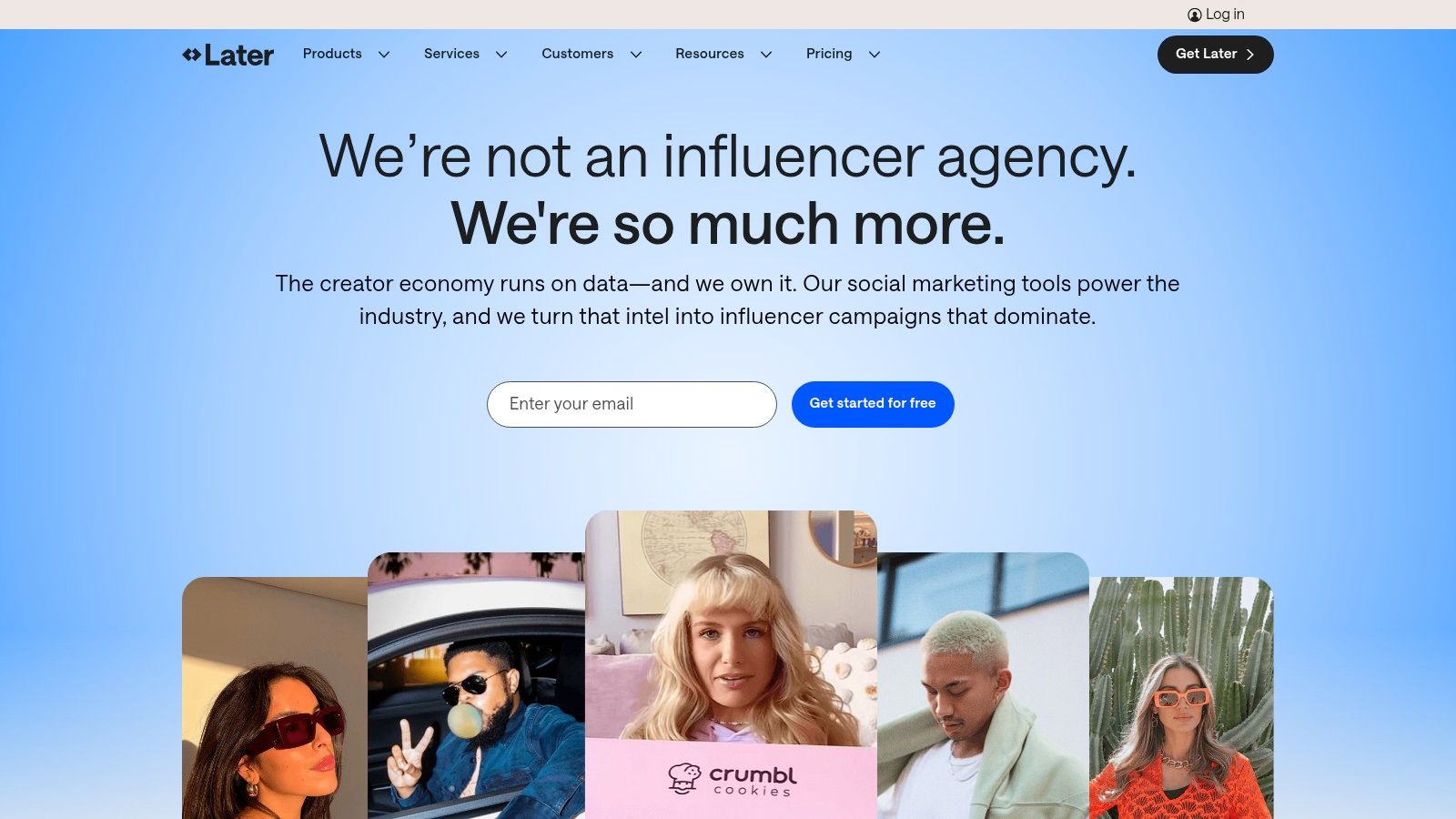
What distinguishes Later Influence is its focus on operational excellence, particularly around creator compensation and campaign logistics. The platform provides exceptionally clear guidance and tooling for payment operations, including tax form support, product seeding, and incentive management. The ability to white-label the entire experience with custom domains makes it a powerful tool for agencies and brands building a proprietary creator network.
Key Details & Considerations
Best For: Enterprise brands and agencies that require a fully integrated social media and influencer management solution with strong payment and workflow automation.
Pricing: Custom quote-based. An additional 10% incentive management fee applies when using Later-owned payment accounts for creator payouts.
Pros: Excellent enterprise-level workflows, strong managed service support, and clear, well-supported payment and incentive management tools.
Cons: The custom pricing model and additional fees make it a costly option, likely placing it out of reach for smaller businesses.
Website: https://later.com/
7. Klear by Meltwater
Klear, now part of the Meltwater suite, establishes itself as a powerful influencer marketing platform focused on deep, data-backed insights. It excels in providing sophisticated analytics, moving beyond vanity metrics to offer advanced audience authenticity screening and robust fraud detection. The platform empowers brands to discover, vet, and activate creators with confidence, ensuring partnerships are built on a foundation of genuine influence and audience alignment.
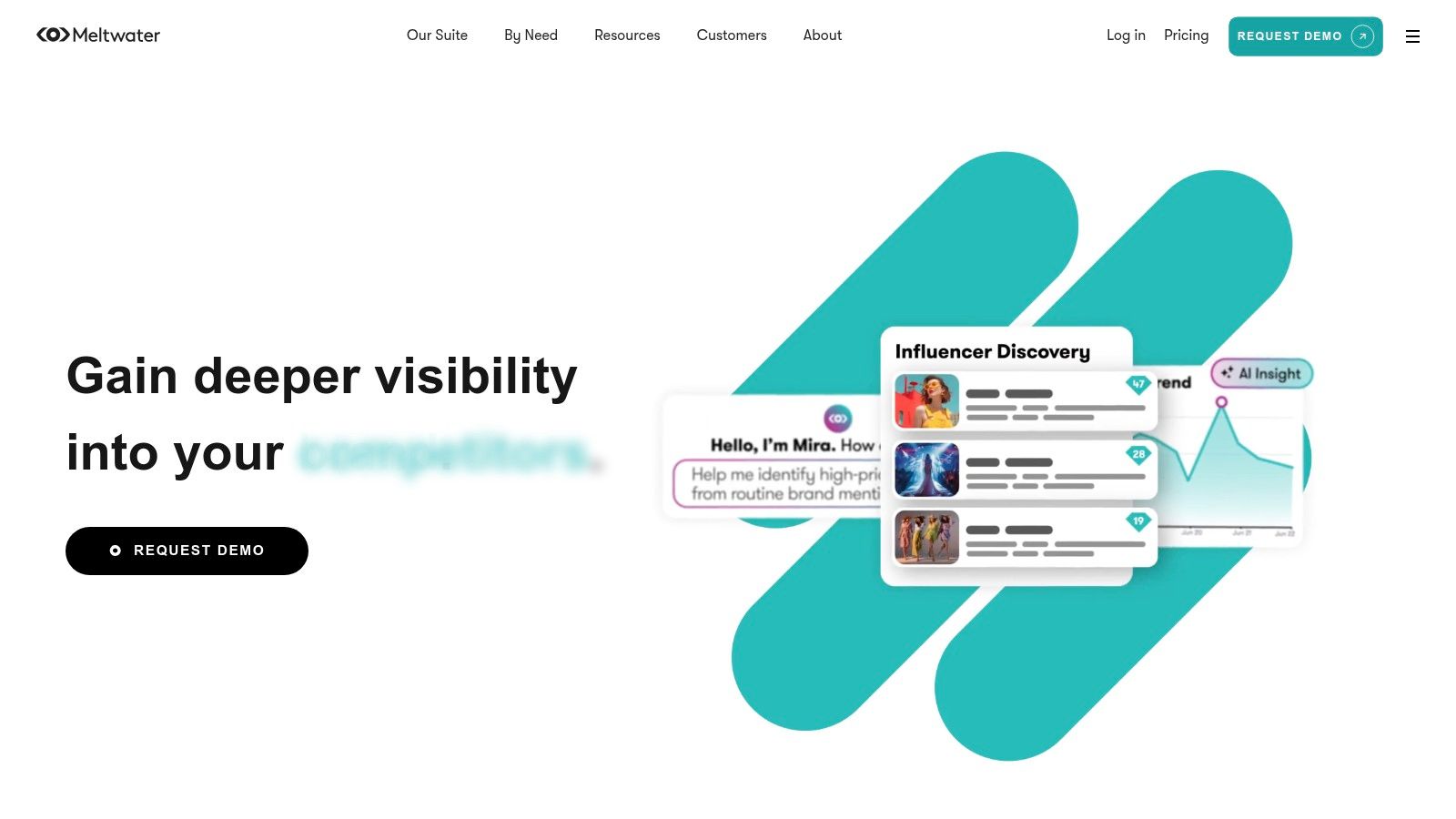
What truly distinguishes Klear is its integration with Meltwater's broader media intelligence capabilities, offering a holistic view of a campaign's impact across social and traditional media. This comprehensive approach, combined with its end-to-end management tools including payments and conversion tracking, makes it a top choice for data-centric marketing teams.
Key Details & Considerations
Best For: Mid-market and enterprise brands that prioritize data integrity, fraud prevention, and comprehensive campaign measurement.
Pricing: Quote-based. Pricing is tailored to team size, feature requirements, and access to the wider Meltwater intelligence suite.
Pros: Exceptional analytics depth with a strong focus on anti-fraud tools, enterprise-grade reporting capabilities, and seamless integration with broader media monitoring.
Cons: The custom pricing model is geared toward larger teams with significant budgets, making it less accessible for small businesses or startups.
Website: https://www.meltwater.com/
8. Traackr
Traackr is a performance-driven influencer marketing platform focused on optimizing influencer investment through advanced governance, benchmarking, and standardized measurement. It is particularly favored by global beauty, fashion, and consumer brands looking to scale their programs effectively. The platform emphasizes a data-first approach, enabling users to make strategic decisions based on audience demographics, brand safety, and competitive intelligence rather than just follower counts.
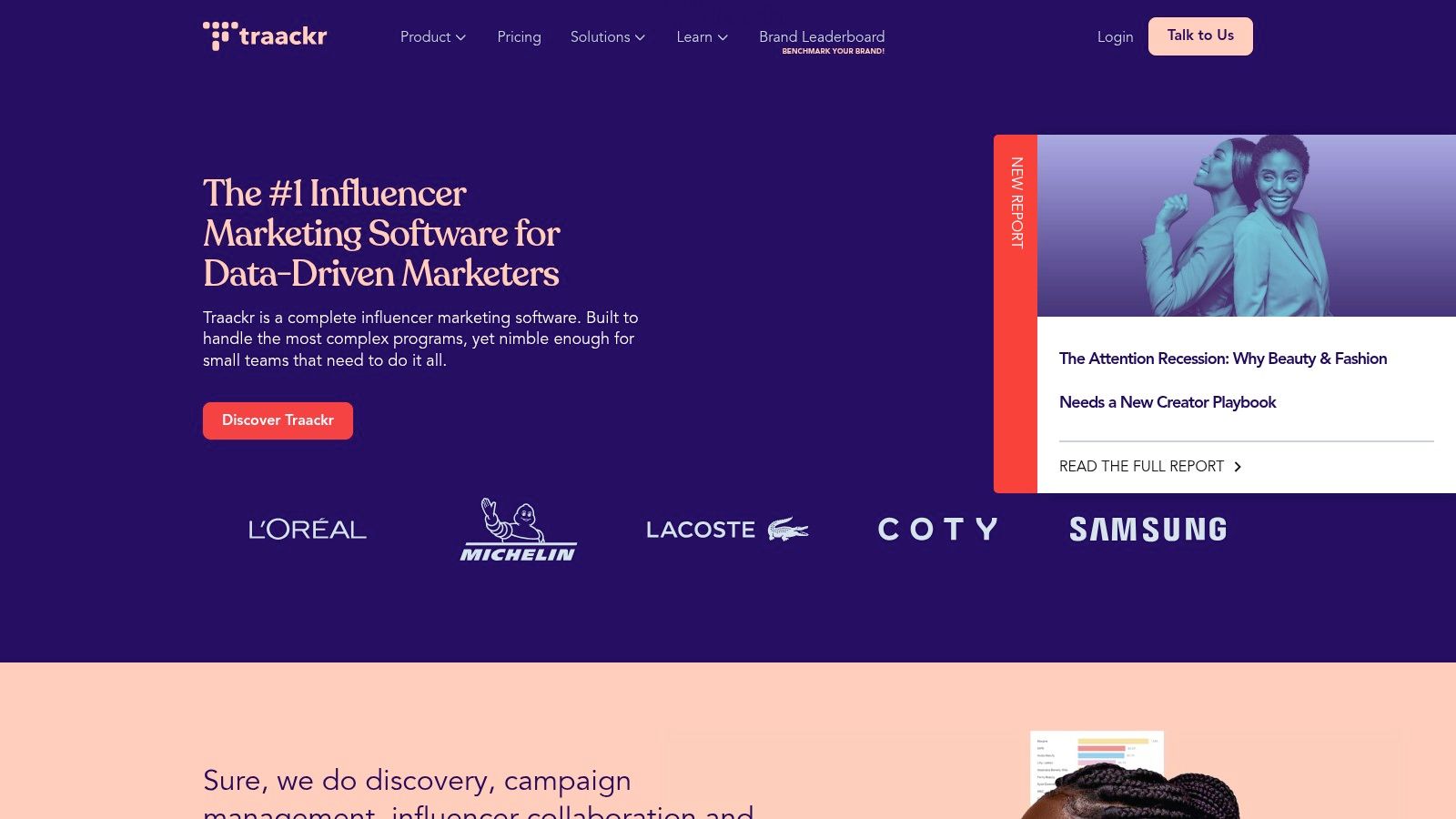
What makes Traackr stand out is its commitment to proving the value of influencer marketing with standardized metrics. It offers a proprietary Brand Vitality Score (VIT) to measure visibility, impact, and trust, providing a clear framework for campaign success. This focus allows brands to manage complex global campaigns, ensure consistent evaluation, and maximize their return on investment.
Key Details & Considerations
Best For: Enterprise-level consumer brands, especially in beauty and lifestyle, that require a system for standardizing influencer measurement and proving ROI at scale.
Pricing: Based on annual plans with user seat minimums. While quote-based for enterprise, some tiers have transparent starting prices, but they represent a significant investment.
Pros: Strong focus on performance and investment optimization, industry-specific benchmarking, and transparent starting prices for some plans.
Cons: High annual minimum costs and mandatory user seat minimums make it inaccessible for smaller businesses. The platform's complexity is geared toward mature marketing teams.
Website: https://www.traackr.com/
9. Aspire
Aspire uniquely blends a full-stack influencer marketing platform with a vibrant creator marketplace, making it a powerful tool for brands focused on authentic collaborations. It supports the entire campaign lifecycle, from discovery and outreach to product seeding, affiliate tracking, and detailed analytics. The platform simplifies building long-term creator relationships by automating historically manual processes like product fulfillment and content collection.
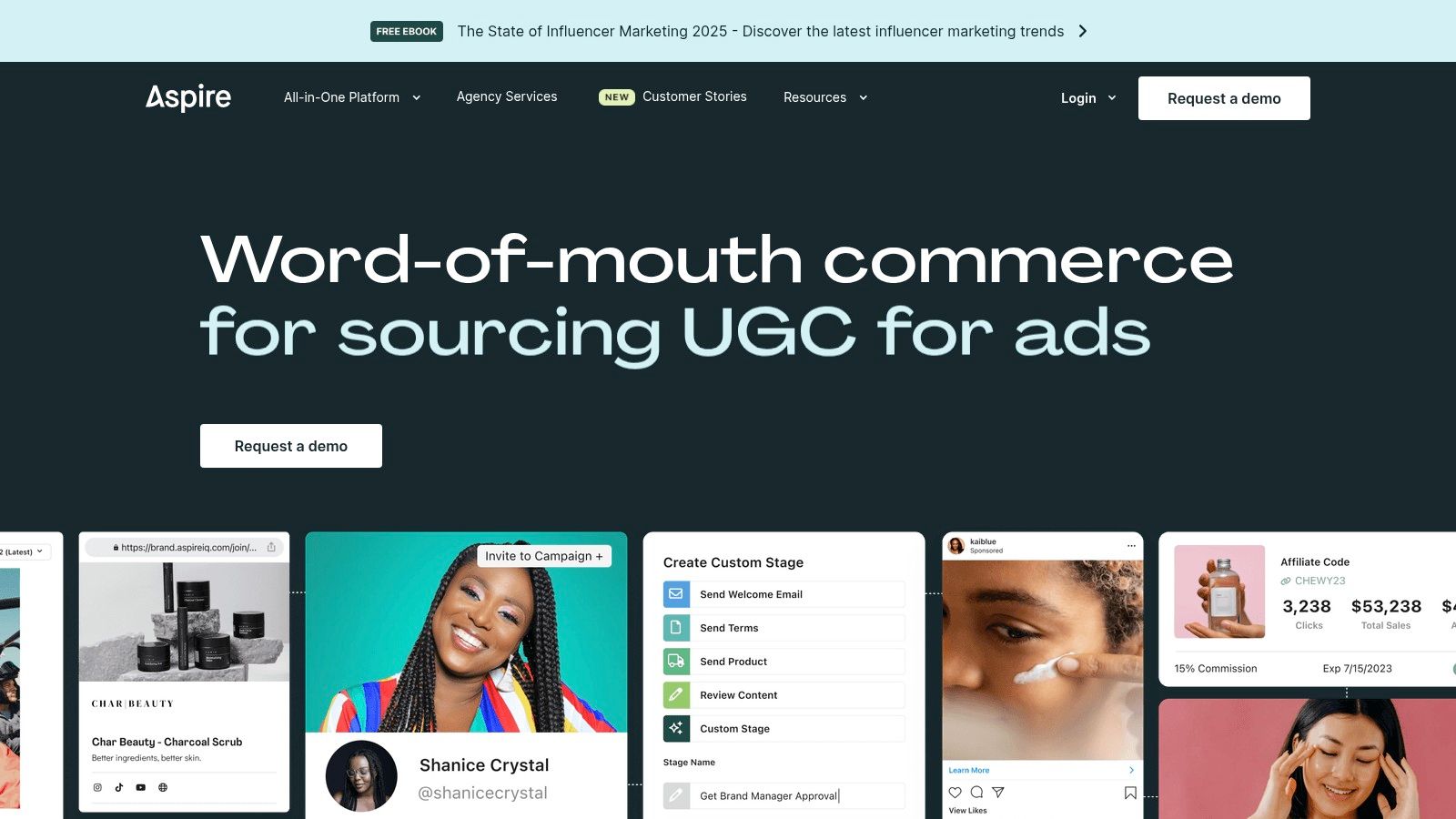
What truly distinguishes Aspire is its creator marketplace, which allows brands to receive unlimited inbound applications from over a million creators for free. This feature, combined with strong e-commerce integrations like Shopify, makes it one of the top influencer marketing platforms for direct-to-consumer brands looking to scale their creator programs efficiently and identify influential customers already within their network.
Key Details & Considerations
Best For: E-commerce and DTC brands of all sizes, especially those using Shopify, who want to streamline product seeding and manage inbound creator interest.
Pricing: Custom quote-based for the full platform. The creator marketplace offers a "forever-free" plan for inbound applications.
Pros: Access to a free creator marketplace with no creator fees, excellent e-commerce workflows, and strong educational resources for users.
Cons: Full platform access is sales-led with custom pricing. Valuable add-ons, such as curated creator invite packs, come at an additional cost.
Website: https://www.aspire.io/
10. LTK Connect
LTK Connect offers brands a direct pipeline to LTK’s highly curated network of shopping-focused creators. As a self-serve platform, it streamlines the process of running paid campaigns and managing affiliate relationships, making it a go-to for direct-to-consumer brands in fashion, beauty, home, and retail. Its core function is to connect businesses with influencers whose audiences have a strong, demonstrated intent to purchase.
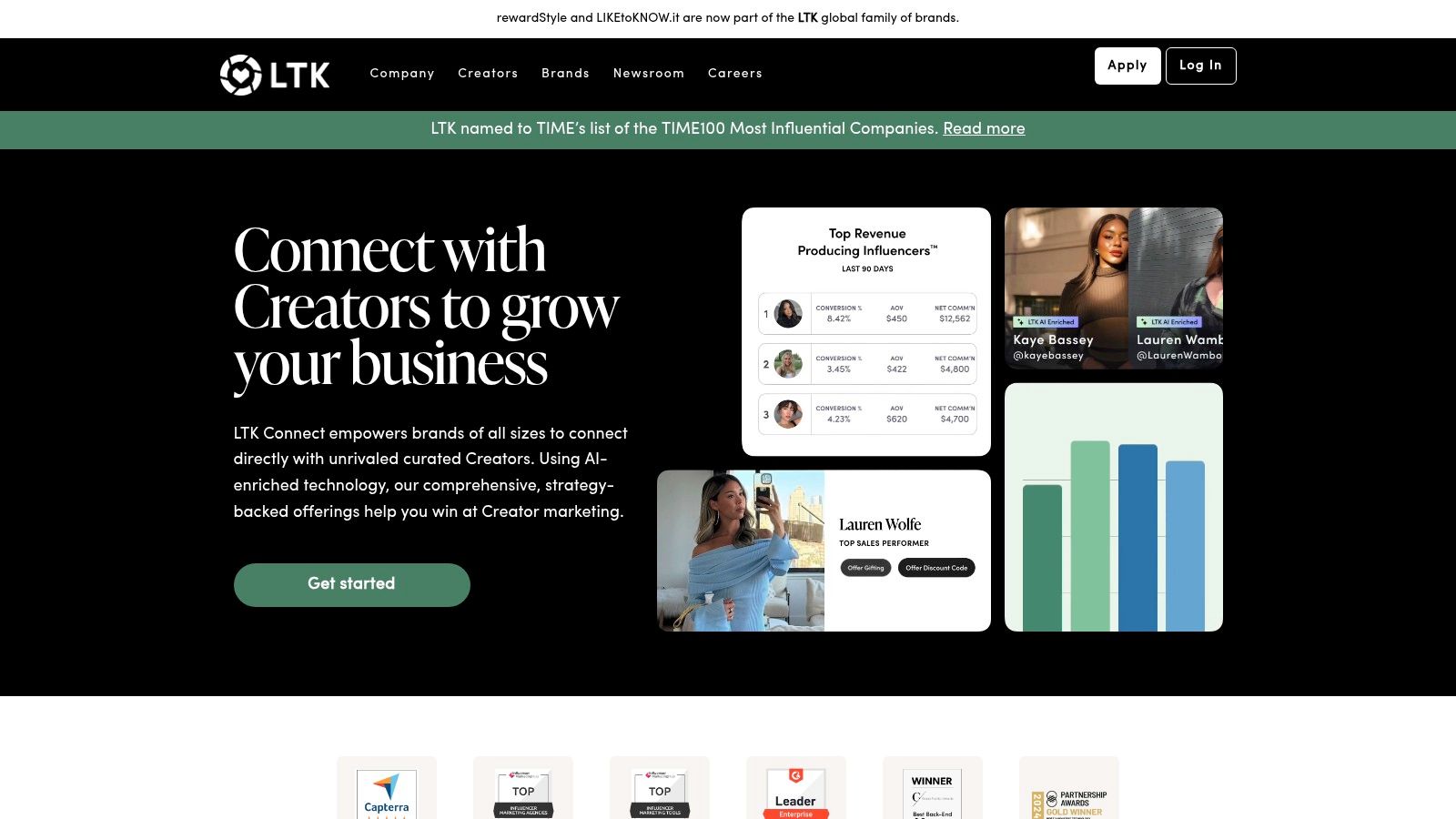
What makes LTK Connect stand out among other top influencer marketing platforms is its laser focus on commerce-driven content. Brands can easily discover creators, cast them in campaigns, and track performance through sales and commissions. The platform provides a clear, efficient workflow for both one-off collaborations and long-term affiliate partnerships within a single ecosystem.
Key Details & Considerations
Best For: E-commerce and retail brands, particularly in the fashion, beauty, and lifestyle sectors, looking for a self-serve solution to drive sales.
Pricing: Tiered monthly subscriptions with transparent pricing. Plans often come with caps on the number of monthly active creators and annual spend.
Pros: Access to a large, vetted creator network with high purchase intent audiences, and clear, self-serve pricing tiers suitable for various budgets.
Cons: Lower-tier plans have significant limitations, including caps on monthly creator collaborations and total annual campaign spend, which may hinder scalability.
Website: https://company.shopltk.com/connect
11. TikTok One
TikTok One is the social media giant’s all-in-one, official platform for brand-creator collaborations. It consolidates key tools like the Creator Marketplace, Creative Center, and Creative Exchange into a single ecosystem. This integration allows brands to manage their entire campaign lifecycle natively, from discovering vetted creators to managing branded content approvals and accessing performance data directly from the source. The platform simplifies the process of finding partners who meet specific, verified criteria set by TikTok itself.
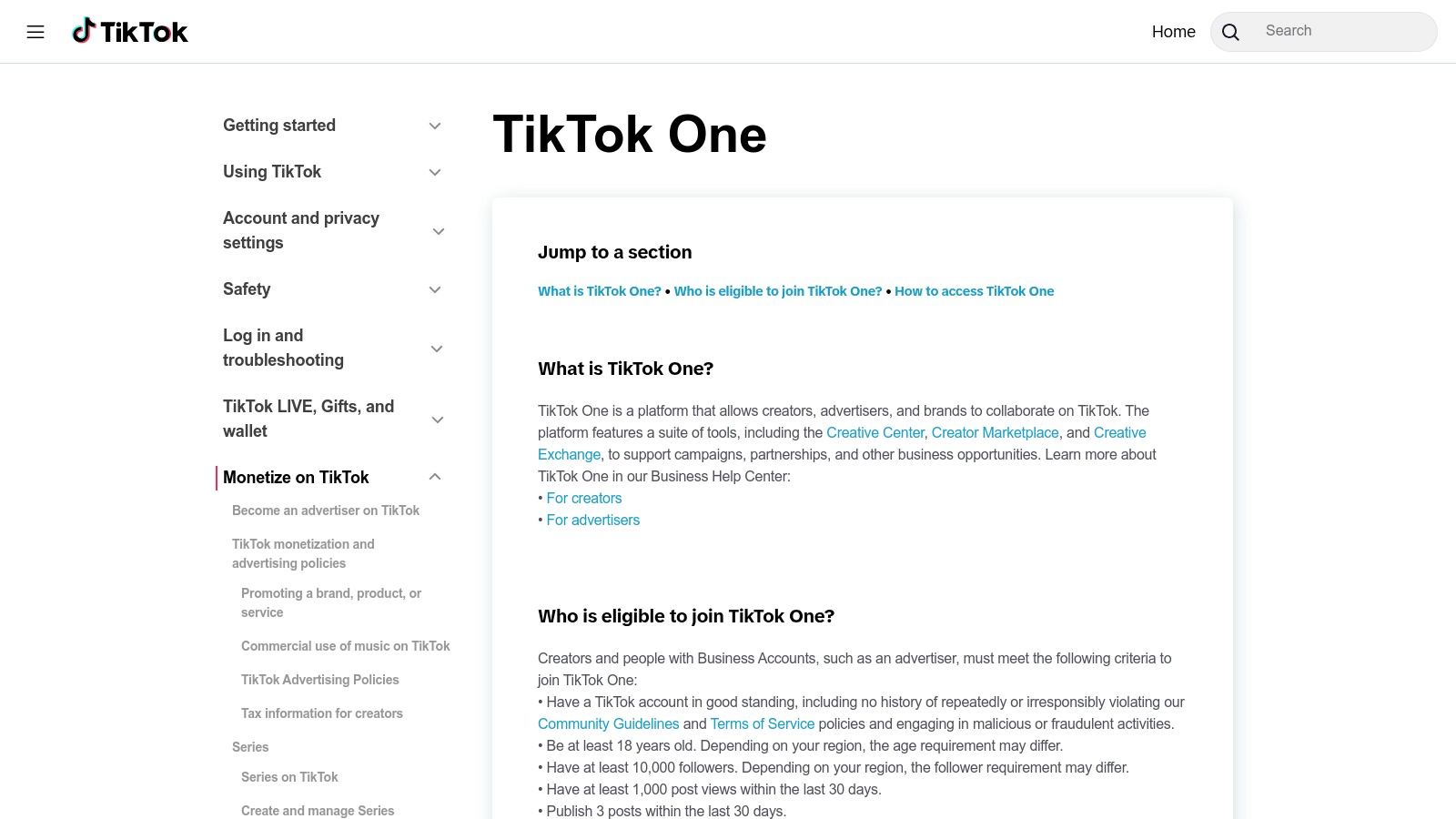
What makes TikTok One a unique player among top influencer marketing platforms is its reliance on first-party data. Unlike third-party tools that estimate performance, TikTok provides actual, real-time analytics, ensuring unparalleled accuracy in campaign measurement. This direct access streamlines branded content workflows and provides a secure, transparent environment for both brands and creators to collaborate effectively within the platform’s native framework.
Key Details & Considerations
Best For: Brands of all sizes that are heavily invested in the TikTok ecosystem and want to leverage first-party data for their influencer campaigns.
Pricing: Access to the platform is generally free for eligible business accounts, but campaign costs are determined by creator negotiations and ad spend.
Pros: Unmatched access to first-party data, streamlined and official branded content approval process, and a native campaign management toolkit.
Cons: Limited to the TikTok platform only. Creator eligibility thresholds (e.g., minimum followers) can be restrictive, and sudden policy changes can impact features.
Website: https://support.tiktok.com/en/business-and-creator/tiktok-one
12. Shopify Collabs
Shopify Collabs is the platform’s native solution designed to connect its vast ecosystem of merchants directly with creators. It simplifies the process for direct-to-consumer (DTC) brands to recruit and manage affiliates and influencers, all from within the familiar Shopify dashboard. The platform allows merchants to create a branded application page, review creator profiles, send product gifts, and generate unique affiliate links for tracking sales.
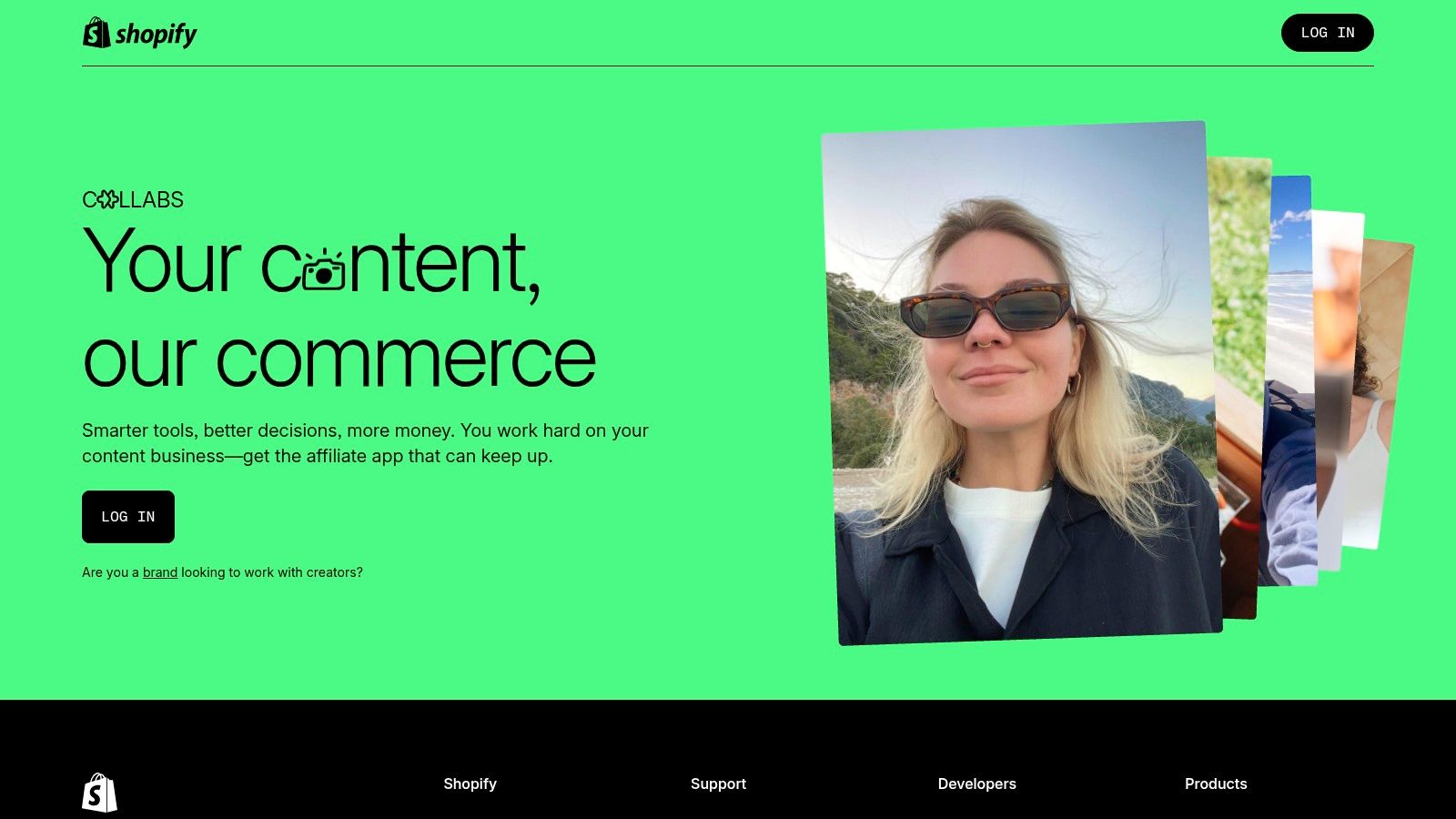
Its biggest advantage is its seamless integration. Payments are handled directly through Shopify, removing the need for third-party payment processors or manual invoicing. For brands leveraging platforms like Shopify Collabs, understanding the nuances of how to approach successful strategies for engaging in affiliate marketing on Shopify is paramount for effective partnerships. This makes it an incredibly low-friction entry point into influencer marketing for any brand already operating on Shopify.
Key Details & Considerations
Best For: Shopify-based DTC brands, particularly small to medium-sized businesses, looking for a simple, integrated tool to launch and manage affiliate programs.
Pricing: Free to install for Shopify merchants. Shopify charges a 2.9% payment processing fee on all commissions paid out to creators.
Pros: Native integration with Shopify provides a streamlined workflow. There are no additional monthly subscription fees beyond the standard Shopify plan.
Cons: It is exclusively for Shopify merchants and lacks the multi-platform analytics of standalone tools. Creator discovery is also limited compared to larger, dedicated platforms.
Website: https://www.shopify.com/collabs
Top 12 Influencer Marketing Platforms Comparison
CreatorIQ: CreatorIQ offers influencer discovery, CRM tools, enterprise integrations, and detailed analytics. It provides deep analytical capabilities and strong governance features, earning a quality rating of ★★★★☆. Pricing is quote-based and geared toward enterprise clients. The platform targets mid-market and large brands, standing out for its secure ecosystem and industry research, and events.
GRIN: GRIN combines influencer CRM, real-time analytics, and payments management. It delivers mature workflows, particularly aligned with Shopify, and has a user experience rated ★★★★☆. Pricing is custom and can be expensive for small teams. Its main audience is e-commerce and Shopify-based brands. GRIN’s standout features include integrated tax handling and automated payments.
Upfluence: Upfluence provides influencer discovery, AI-powered outreach, and affiliate marketing tools. With a broad toolset and support for global payouts, it has a solid user experience rated ★★★★. The platform uses custom pricing, which may be costly for smaller teams. It serves brands that need comprehensive influencer marketing tools and differentiates itself with Amazon integrations and AI-driven outreach.
impact.com/Creator: This platform focuses on creator programs, affiliate tracking, and managed services. It emphasizes performance metrics that go beyond vanity figures, earning a ★★★★ rating. Pricing is custom and sales-led. The primary users are affiliate and partnership programs. Its key strengths are conversion tracking and lifetime value measurement.
Sprout Social Influencer: Sprout Social Influencer includes discovery tools, campaign analytics, and conversion tracking. It integrates deeply with social platforms and maintains transparent pricing, achieving a ★★★★☆ rating. Pricing is quote-based and may be on the higher side. The tool targets social media teams and agencies, offering unique features such as social data integration and fee estimation tools.
Later Influence: Later Influence offers payments, incentive management, private labeling, and campaign management tools. It provides enterprise-grade workflows and managed service options, rated ★★★★ for user experience. Pricing is custom and includes incentive fees. The platform caters to enterprise brands and agencies, with standout features like white-label capabilities and payment guidance.
Klear by Meltwater: Klear delivers analytics, anti-fraud tools, payments, and performance benchmarking. It’s known for its enterprise-grade data depth and earns a ★★★★ rating. Pricing is custom and typically suited to larger teams. Klear serves mid-market and enterprise clients, distinguishing itself through audience authenticity screening.
Traackr: Traackr features creator search, governance, and benchmarking tools. It focuses on performance optimization and has a user experience rated ★★★★☆. The platform comes with a high annual cost and seat minimums, aimed at consumer and beauty brands. Its key differentiators include standardized metrics and transparent pricing tiers.
Aspire: Aspire offers a creator marketplace, outreach tools, and affiliate tracking. It provides free access to its marketplace and has a user experience rated ★★★★☆. Pricing is custom and sales-led, with optional add-ons at extra cost. Aspire primarily serves e-commerce and creator-driven brands, offering unlimited free inbound creator access as its standout feature.
LTK Connect: LTK Connect provides creator discovery, paid campaign management, and affiliate tools. It offers a transparent, self-serve experience rated ★★★★. Pricing follows clear tiered structures with spend caps. The platform targets fashion, retail, and beauty brands, leveraging a large base of shopping-intent creators as its unique advantage.
TikTok One: TikTok One is the official creator marketplace for branded content and campaign approvals. It offers native TikTok tools and API access, with a strong user experience rated ★★★★☆. Pricing is not publicly available and depends on eligibility. The platform serves TikTok advertisers and creators, standing out with first-party native data and direct branded approval workflows.
Shopify Collabs: Shopify Collabs supports creator recruitment, affiliate links, and commission management. It integrates natively with Shopify and has no additional platform fees beyond a 2.9% payout fee. The user experience is rated ★★★★☆. Designed for Shopify’s DTC merchants, its standout features are seamless Shopify CRM and payment integration.
Choosing Your Platform: What About Organic Growth?
Navigating the landscape of the top influencer marketing platforms can feel overwhelming. We've journeyed through twelve powerful solutions, from enterprise-grade giants like CreatorIQ and GRIN to niche-specific tools like LTK Connect and Shopify Collabs. Each offers a unique pathway to discovering creators, managing campaigns, and measuring the impact of your partnerships.
The core takeaway is that no single platform is universally "the best." The right choice hinges entirely on your specific business model, campaign goals, and budget.
From Campaign Management to Foundational Growth
The platforms we've explored are exceptional at executing and scaling defined influencer campaigns. They are the tactical instruments you use to launch a product, run a promotion, or amplify a specific marketing message through external creators. They provide the structure, analytics, and workflow automation necessary for managing these complex, often short-term, relationships.
However, a successful influencer marketing strategy isn't just about renting someone else's audience. It's also about building your own brand into a destination that attracts followers, fosters community, and generates authority organically. This is where a crucial distinction emerges: campaign management versus foundational growth. While platforms like Upfluence or Aspire help you collaborate, they don't directly grow your own brand's social media identity.
Making Your Final Decision
To select the right tool, move beyond feature lists and ask strategic questions:
Scale of Operation: Are you a small business running a handful of collaborations (consider Shopify Collabs) or an enterprise managing hundreds of global creators (look at GRIN or CreatorIQ)?
Primary Goal: Is your main objective affiliate sales (impact.com), brand awareness (Sprout Social), or building a long-term ambassador program (Later Influence)?
Ecosystem Integration: How critical is it for the platform to integrate with your existing e-commerce (Shopify, LTK) or social media management tools (Sprout Social)?
Budgetary Constraints: Are you prepared for a significant annual contract, or do you need a more flexible, performance-based model?
Answering these questions will narrow your list from twelve to the two or three most relevant contenders. From there, requesting demos and speaking with sales representatives will illuminate the best fit for your team's workflow and long-term vision.
Ultimately, the most powerful strategy combines both internal strength and external amplification. By using one of the top influencer marketing platforms to manage your partnerships while simultaneously investing in your own brand's organic growth, you create a self-reinforcing cycle of success. You build an authoritative brand presence that attracts higher-quality collaborators, and those collaborations, in turn, drive more authentic followers back to your profile.
Ready to build the foundational organic growth that makes every influencer partnership more effective? While these platforms manage your collaborations, Gainsty uses advanced AI to grow your Instagram with real, engaged followers, strengthening your brand's core authority. See how our AI-powered service can complement your strategy at Gainsty.
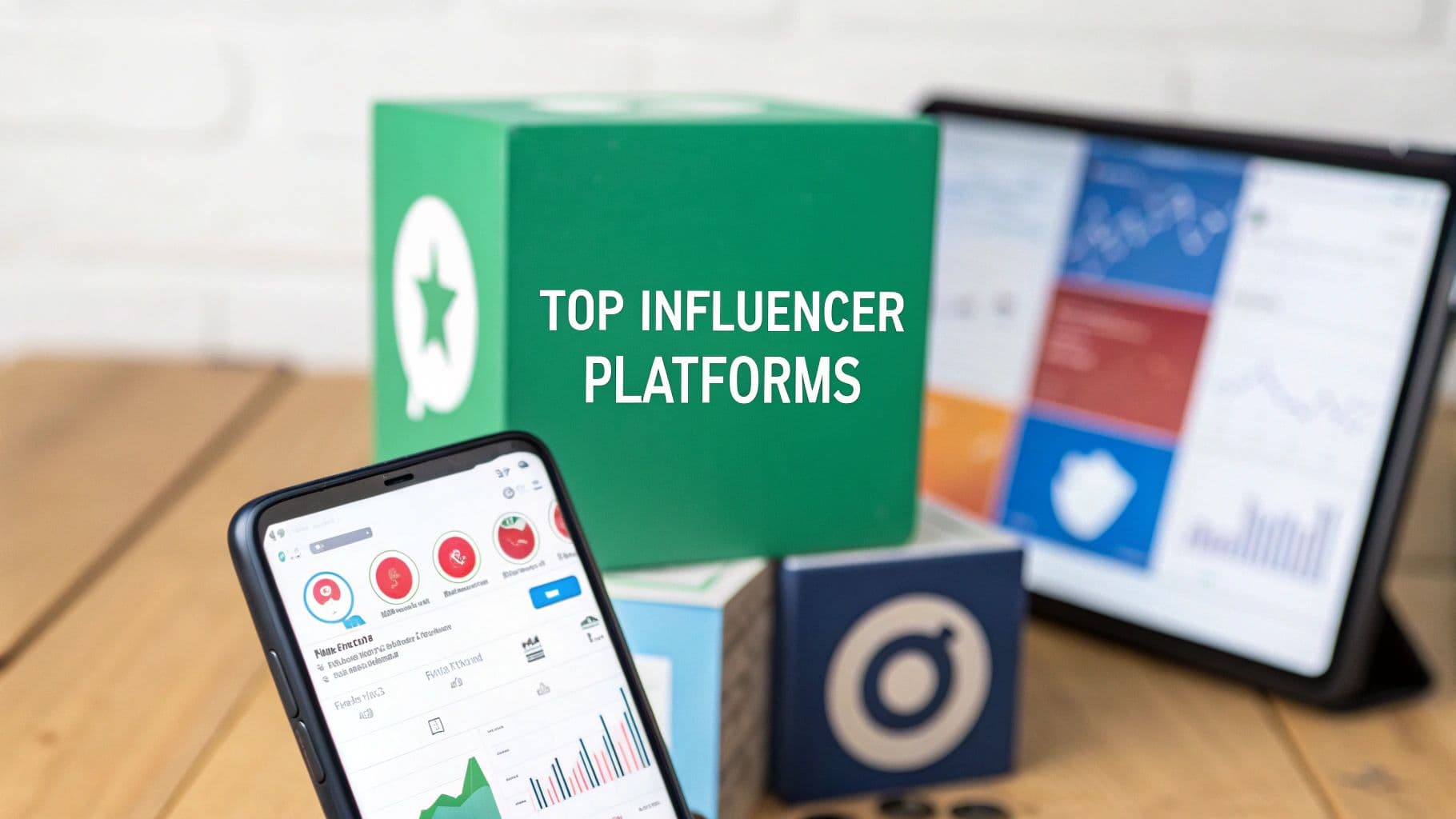
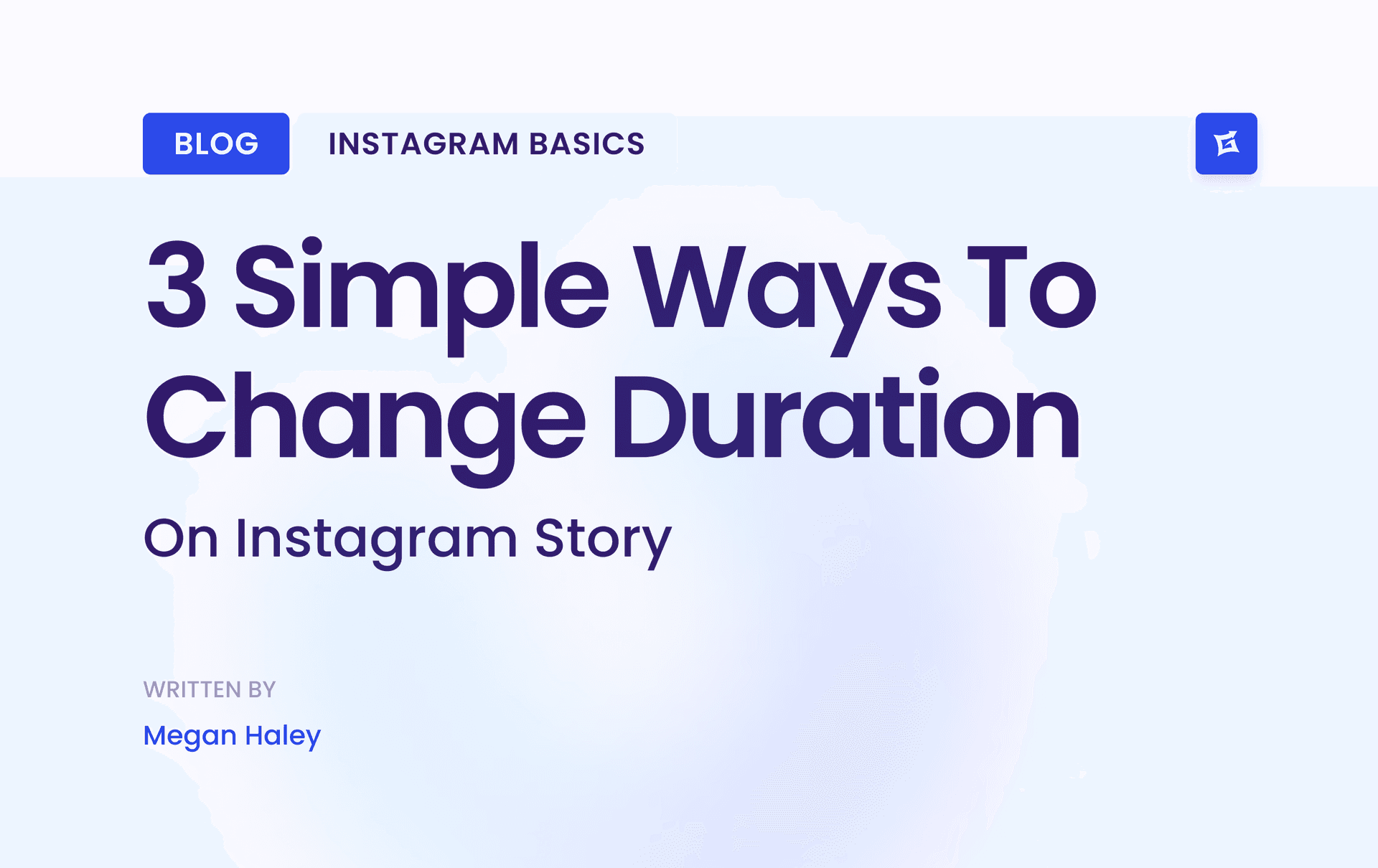
.png&w=1920&q=75&dpl=dpl_Z6gu6XbtMvtEWfqp1ffTThfB5gRx)
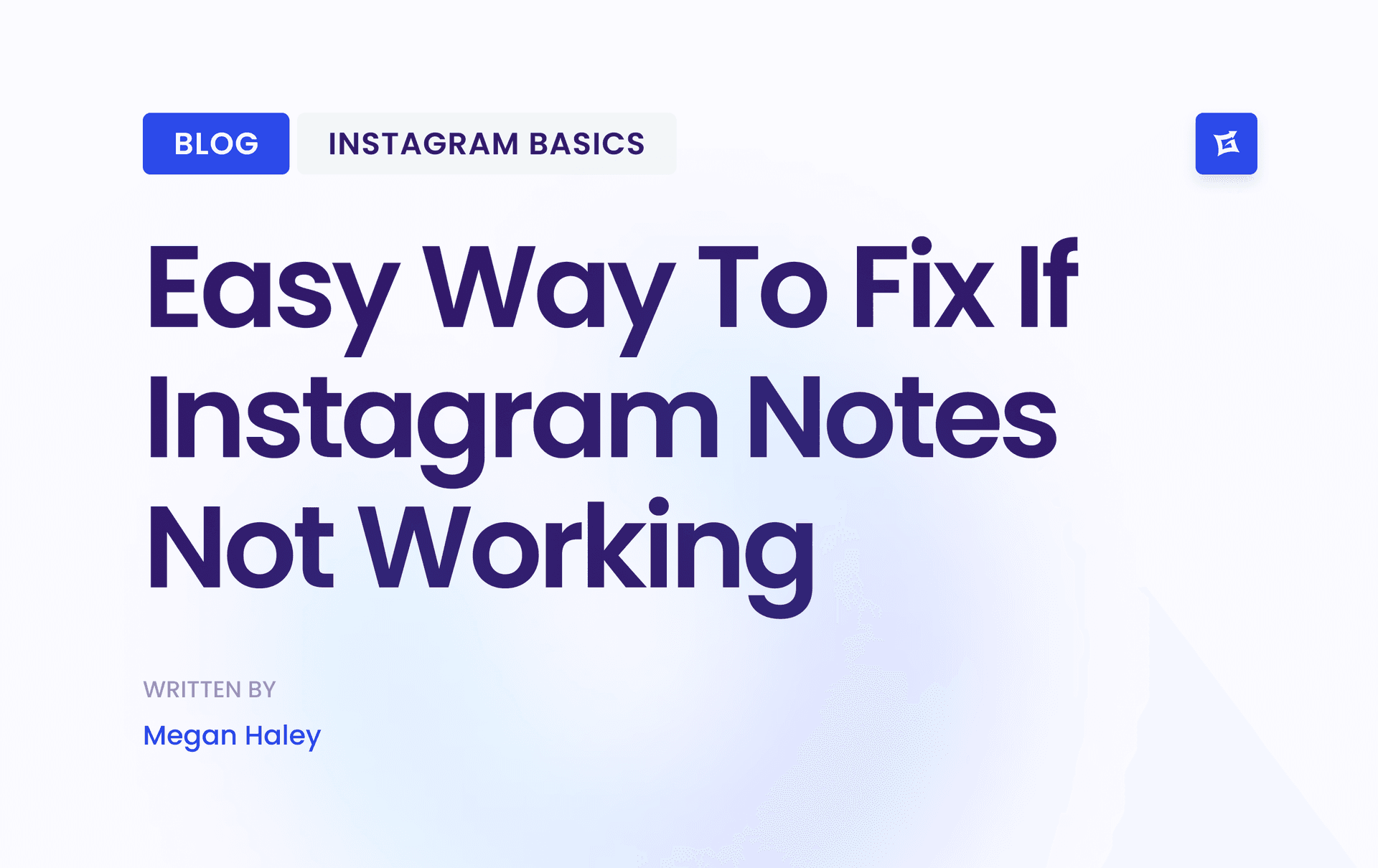
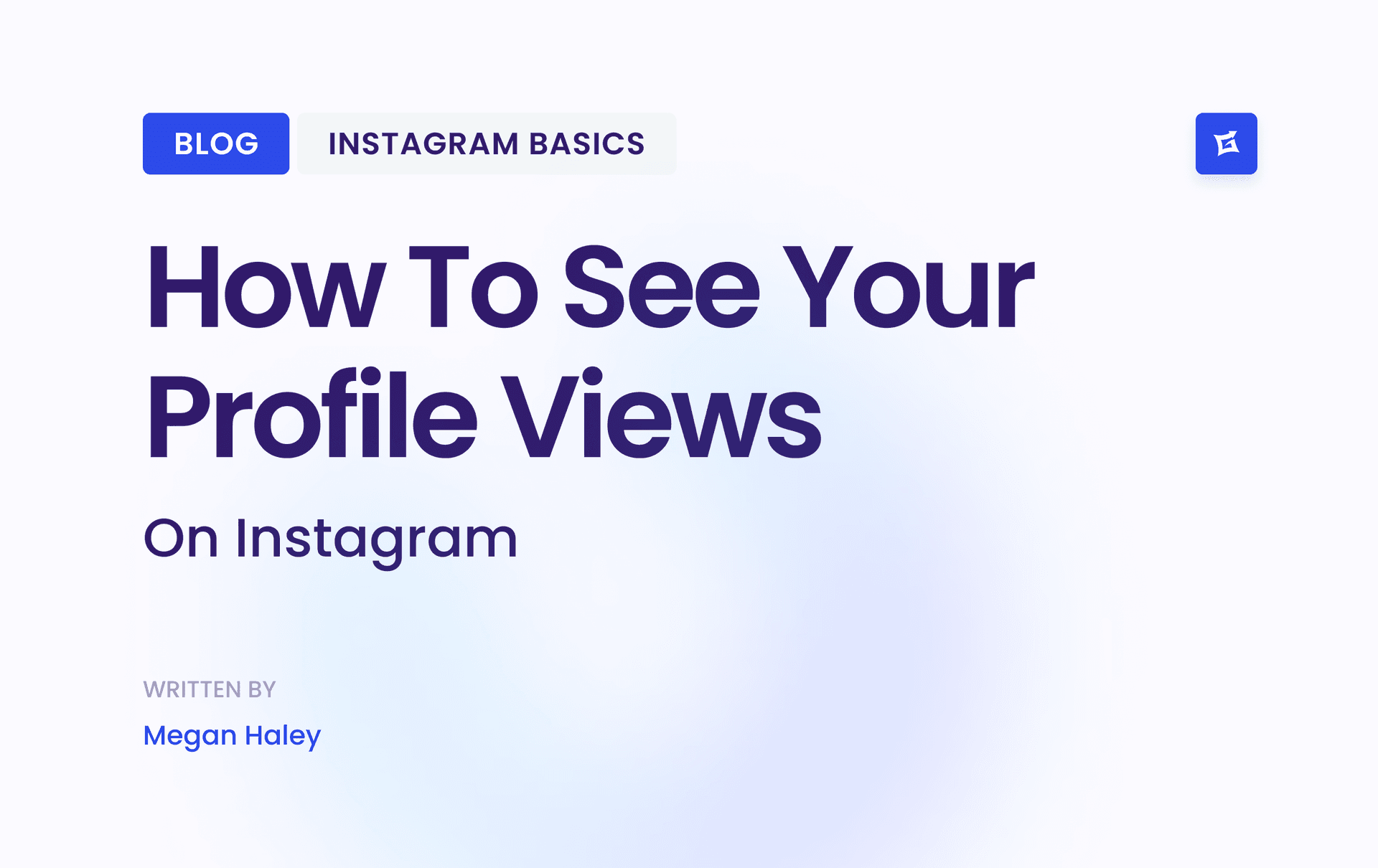
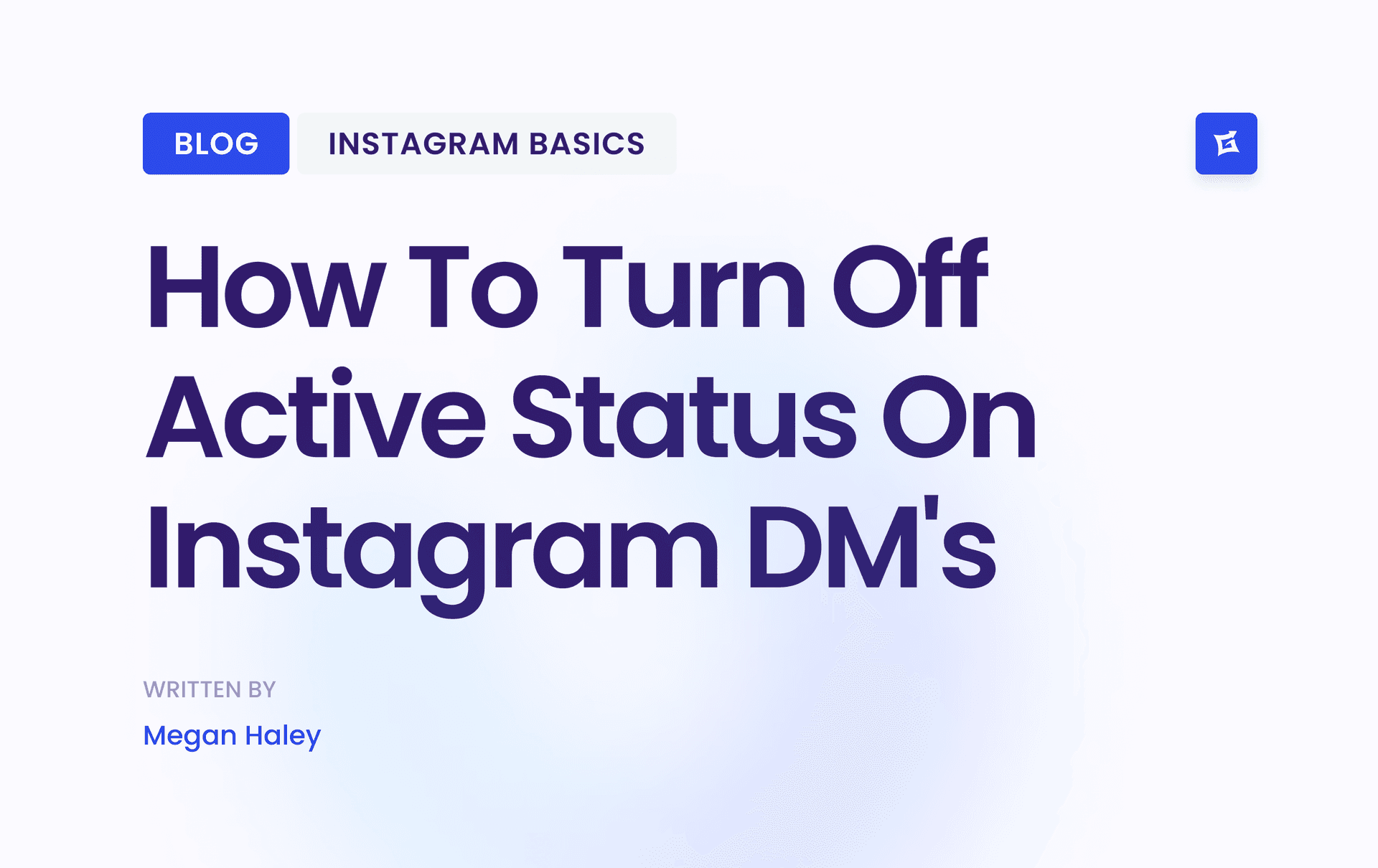
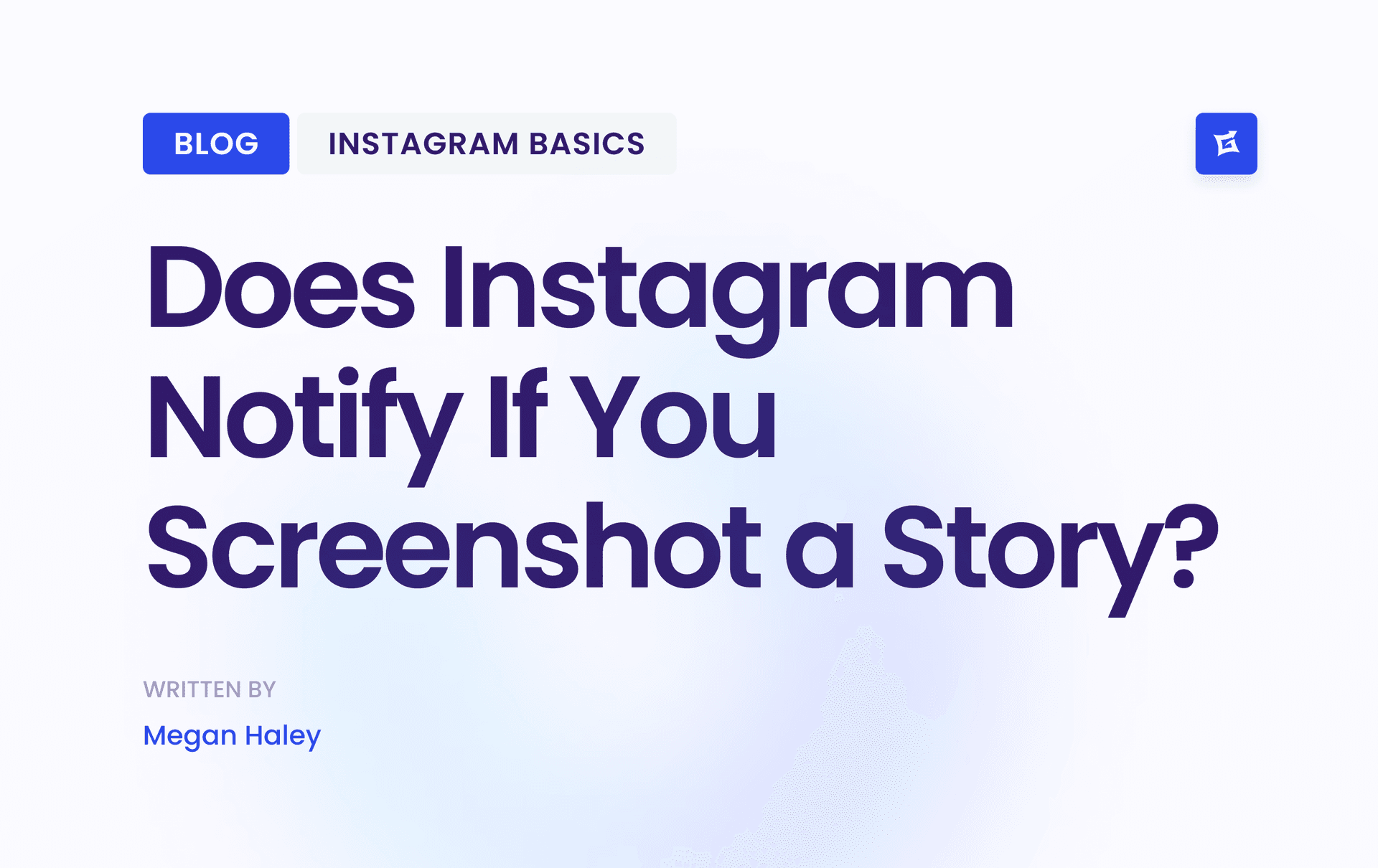



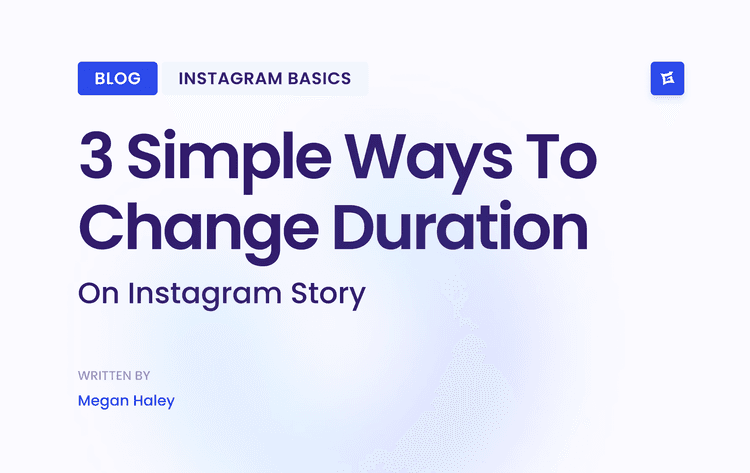
.png&w=750&q=75&dpl=dpl_Z6gu6XbtMvtEWfqp1ffTThfB5gRx)
